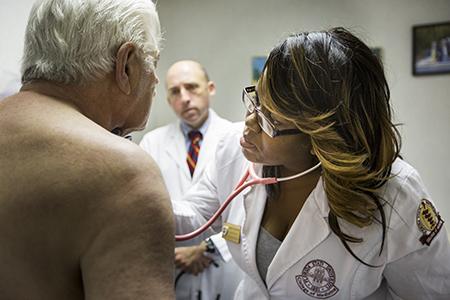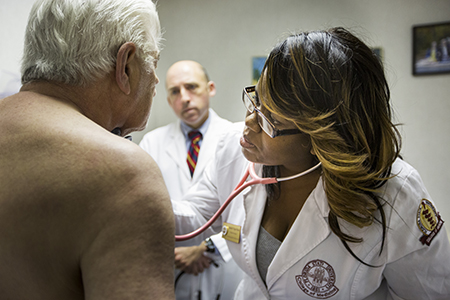MGT update: 'By all measures, we are realizing the vision'


May 2016
The FSU College of Medicine remains laser-focused on its mission, making an important impact on the medical, educational, social and economic health of Florida, according to a report prepared by MGT of America Inc.
“Not only was [the college] expected to offer high-quality instructional programs for students, but also it was intended to become a socially responsive medical school,” states the socioeconomic impact study, published this month. “In particular, the school’s founding mission identified Florida’s need for primary-care physicians, particularly for its rural, elderly and other underserved populations. On all these counts, the College of Medicine clearly has been successful.”
MGT knows the College of Medicine well. In the 1990s, it was involved in studies exploring whether Florida’s existing physician workforce could supply enough primary care for all of its residents — and whether the state would need new medical schools to produce more physicians. Its findings helped persuade the Florida Legislature in 2000 to create the College of Medicine, the country’s first new M.D. program in nearly 25 years.
Five years ago, Dean John P. Fogarty had MGT perform a socioeconomic impact study to determine whether the medical school had met its legislative mandate during its first 10 years. Last year, he asked MGT to update that report.
“I am very pleased with how well they captured our continued focus on our mission, the success of our medical education model, and the value and contributions of our regional campuses to that success,” Fogarty said. “Their report also reflects our continued maturation as a medical school as we highlight our tremendous research growth and success and our partnerships with local and regional hospitals to bring mission-focused residency education programs to keep our graduates in the state.”
The 96-page report comprises chapters on fulfilling workforce and social impact missions; economic impacts; additional educational and social impacts; and impact on research.
Among the achievements MGT noted:
- “Half of Class of 2010 graduates who are now in practice have elected to stay in Florida — a retention rate that is highest among the state’s medical schools and 30 percent greater than the national average.”
- “More than half (54 percent) of College of Medicine graduates in 2015 pursued residency training in primary care, compared with just 41 percent nationally.”
- “Nearly 14 percent of the 213 College of Medicine graduates who are practicing in Florida have established practices in rural counties, although those counties constitute only 6 percent of the state’s population.”
- “Graduates are being selected by highly competitive residency programs and are attaining the prestigious ‘chief resident’ designation at well above average rates.”
- “Nearly 14 percent of its [enrollees] (2011-15) are African-American or Native American, compared with just over 4 percent of the Florida M.D. workforce.”
- “Community faculty members who serve as physician mentors agree that ‘College of Medicine students are better prepared technically, more professional, and have stronger patient skills.’”
- FSU has seen “Significant increases in sponsored research awards, with College of Medicine faculty generating the second highest increase in the number of awards and third highest percentage increase.”
- For state taxpayers, the annual return on investment amounted to nearly 473 percent, exclusively in terms of economic benefit – up from the estimated 410 percent in 2010.
The report also noted that the college has affiliation agreements statewide with more than 100 hospitals, county health departments, clinics, surgery centers and similar organizations; has received strong support from all the communities where its programs train students; has opened two new graduate medical education programs; has received initial accreditation for two more; and is on track to accept the first students in its new physician assistant program next year.
“By all measures, we are realizing the incredible vision of our founders,” Fogarty said. Referring to the Florida Panhandle senator/physician who had sponsored the legislation creating the College of Medicine, he added: “I’m sure Durell Peaden would be VERY proud.”
To read the online report: https://issuu.com/fsumed/docs/2015_update_-_mgt_socioeconomic_imp.
To get a printed copy, or to ask questions, call 850-645-9698.

